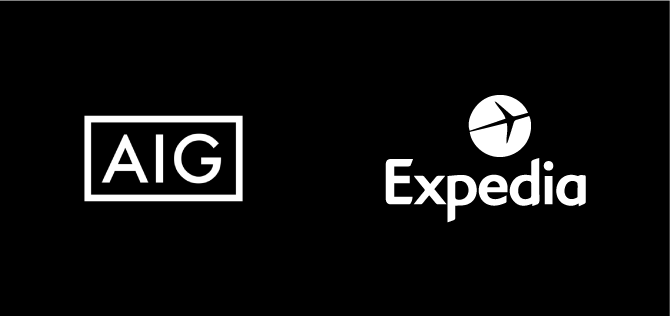The Chosen Ones
I was under the impression that insurance companies had an unofficial pact where the status quo must be maintained at all times. Legit comparison sites? Let’s give them EverQuote. Price? Let’s all say we have great/fair prices. Insurtech? Yes, let’s do it. Chatbots? You got it.

On March 2, 2018, AIG broke the pact when they announced that Expedia has selected them to offer travel insurance for their customers. In other words, a ~$16B company chose a ~$51B company. But as Mark Twain said, it’s not the size of the dog in the fight, it’s the size of the fight in the dog. And let’s not forget Uber’s announcement, choosing Allstate and Farmers to offer ridesharing insurance along with Progressive and James River.
Partnering with Expedia is great news for AIG, but it’s concerning for everyone else . By choosing just one travel insurance partner, Expedia delivers a very clear message: insurance is insurance, so there’s no need to confuse customers at the checkout process with multiple insurers that look and sound the same.
In the past few years, the insurance industry has woken up from a deep sleep to prepare for the digital customer of the future. Terms like customer experience, big data, AI, insurtech, and on-demand, were (and are) used to give us the impression that the industry is ready for the revolution. When the insurtech wave hit, many talked about disruption, but that’s not happening anytime soon. If you look at disruptive companies like Dollar Shave club, Netflix and Uber you’ll notice that they all offer a solution for a service/product of frequent use; people shave, take cabs and watch movies frequently. A company needs two things to be disruptive: (1) a better solution and (2) wide adoption. Imagine if Uber existed in a world where people only took a cab once a year… Insurance isn’t a product of frequent use. This means that wide adoption will take time, and time is something most players don’t have. Truth is, the industry lost its soul – the insurance agent, in the age of GAFA (Google, Apple, Facebook, Amazon). The insurance agent is a living, breathing organism that is able to sell a policy from one insurer over another. When people bought an insurance policy through a good agent, they remained loyal, even when other agents came along with better prices. The agent, and only the agent, was the key differentiator between one insurance company and another.
When you sell the same product, it’s distribution that sets you apart. Before the internet, insurance companies relied on persuasive sales agents and offline advertising. Once the internet took over, consumers expected a new standard – competitive, straightforward pricing and customer reviews; things the insurance industry isn’t known for. But sales aren’t just about pricing and reviews – they’re also about convenience, brands, and trust. Still, insurance is a product like no other; it is the only product you pay for but can’t feel, unless you file a claim. To make it worse, many insurers devalued their brand by making insurance about price. So, when you take a product you can’t feel, and when you continuously talk about its price, you create a breed of customers that will replace you to save $100 a year, without guilt (and in the future – without clicks), especially since there’s no agent-relationship.
The online advertising landscape is challenging for most; the conversion rate for US online shoppers in Q3 of 2017 was just 2.49%. And when you pay for costly clicks it gets worse. Imagine if an insurance agency had to pay $50 for each customer that came in the door just to look around – I’m pretty sure the agency owner will place a door sign that reads “SERIOUS CUSTOMERS ONLY”. Add this to the fact that GEICO is no Gucci and Progressive is no Prada, and you’re faced with a serious distribution problem.
Insurance was and still is about distribution. If Expedia and Uber started a trend, then perhaps Airbnb, WeWork and SoFi will announce their choices very soon. Stay tuned and good luck to everyone.

